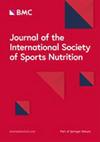苏格兰半职业橄榄球运动员的饮食摄入、知识和认知
IF 4.5
2区 医学
Q1 NUTRITION & DIETETICS
Journal of the International Society of Sports Nutrition
Pub Date : 2021-08-06
DOI:10.1080/15502783.2022.2036436
引用次数: 2
摘要
摘要背景充足的营养摄入在优化表现、恢复和身体成分目标方面发挥着关键作用。本研究旨在调查膳食摄入量(DI);营养知识;以及苏格兰半职业橄榄球运动员的态度、认知和挑战(APC)。方法采用有效问卷对某Super6俱乐部24名男性半职业橄榄球运动员的膳食摄入量和NK进行评价。根据NK得分,球员被分为NK良好或较差。使用研究人员编制的问卷和1-1半结构化访谈对饮食相关APC进行评估。结果平均±SD总NK%较差,为53.7±11.9%。“良好”NK组在体重管理(p=0.014)、宏营养素(p<0.001)、微量营养素(p=0.001)和运动营养(p<0.001)部分得分显著较高。食物来源的平均DIs为26.3±9.2 kcal/kg/天能量、1.4±0.4 g/kg/天蛋白质和21.7±10.1 g/kg/天纤维。碳水化合物摄入量的中位数(第25位、第75位)为3.0(2.0、3.0)g/kg/天,酒精摄入量为6.3(2.3、10.6)单位/周。平均±SD脂肪和饱和脂肪(SFA)%总能量摄入量(EI)分别为36.2±3.7%和12.8±1.9%,SFA%EI超过建议值(p<0.001)。“好”NK组所有常量营养素的摄入量显著较高(p<0.05)。总NK%与肉类(r=0.556,p=0.011)、谷物(r=0.458,p=0.042)、,膳食脂肪(r=0.477,p=0.034)、蔬菜(r=0.487,p=0.030)和酒精饮料(r=0.541,p=0.014)。补充使用率为68%。球员们认为饮食会影响表现(94%),但31%的球员不知道任何特定的营养策略。健康的饮食被认为是“平衡的”,“各种各样的食物”。缺乏准备时间被描述为健康饮食的主要障碍。结论总的来说,球员的NK能力较差,他们的纤维和碳水化合物摄入量不理想,而饱和脂肪摄入量超过了建议。许多人对当前的运动营养指南缺乏认识。可能需要进一步的营养教育来提高饮食质量和帮助实现绩效目标。本文章由计算机程序翻译,如有差异,请以英文原文为准。
Dietary Intakes, Knowledge, and Perceptions of Semi-professional Rugby Athletes in Scotland
ABSTRACT Background Adequate nutritional intake plays a pivotal role in optimizing performance, recovery, and body composition goals. This study aimed to investigate the dietary intakes (DIs); nutritional knowledge (NK); and attitudes, perceptions, and challenges (APC) of semiprofessional rugby players in Scotland. Methods Dietary intakes and NK of 24 male semiprofessional rugby players of a Super6 club were evaluated using validated questionnaires. Players were categorized as having good or poor NK according to NK scores. Diet-related APCs were assessed using researcher-developed questionnaires and 1-1 semi-structured interviews. Results Mean ± SD total NK% was poor, 53.7 ± 11.9%. The ‘Good’ NK group scored significantly higher in the Weight Management (p = 0.014), Macronutrients (p < 0.001), Micronutrients (p = 0.001), and Sports Nutrition (p < 0.001) sections. Mean DIs from food sources were 26.3 ± 9.2 kcal/kg/day energy, 1.4 ± 0.4 g/kg/day protein, and 21.7 ± 10.1 g/day fibre. Median (25th,75th) carbohydrate intake was 3.0 (2.0, 3.0) g/kg/day, and 6.3 (2.3, 10.6) units/week alcohol. Mean ± SD fat and saturated fat (SFA) % total energy intake (EI) were 36.2 ± 3.7% and 12.8 ± 1.9%, respectively, and SFA %EI exceeded recommendations (p < 0.001). The ‘Good’ NK group had significantly higher intakes of all macronutrients (p < 0.05). Total NK% positively correlated with intakes of meat (r = 0.556, p = 0.011), cereals (r = 0.458, p = 0.042), dietary fat (r = 0.477, p = 0.034), vegetables (r = 0.487, p = 0.030), and alcoholic beverages (r = 0.541, p = 0.014). Supplement use was 68%. Players felt diet affected performance (94%) but 31% of them were unaware of any specific nutritional strategies. A healthy diet was perceived to be ‘balanced’ with ‘variety from all food groups. Lack of time for preparation was described as the main barrier to healthy eating. Conclusions Overall, players had poor NK, their fibre and carbohydrate intake was suboptimal, whereas saturated fat intake exceeded recommendations. Many lacked awareness of current sports nutrition guidelines. Further nutrition education may be needed to improve diet quality and aid performance goals.
求助全文
通过发布文献求助,成功后即可免费获取论文全文。
去求助
来源期刊

Journal of the International Society of Sports Nutrition
NUTRITION & DIETETICS-SPORT SCIENCES
CiteScore
8.80
自引率
3.90%
发文量
34
审稿时长
6-12 weeks
期刊介绍:
Journal of the International Society of Sports Nutrition (JISSN) focuses on the acute and chronic effects of sports nutrition and supplementation strategies on body composition, physical performance and metabolism. JISSN is aimed at researchers and sport enthusiasts focused on delivering knowledge on exercise and nutrition on health, disease, rehabilitation, training, and performance. The journal provides a platform on which readers can determine nutritional strategies that may enhance exercise and/or training adaptations leading to improved health and performance.
 求助内容:
求助内容: 应助结果提醒方式:
应助结果提醒方式:


